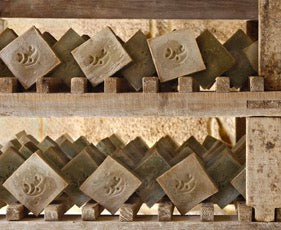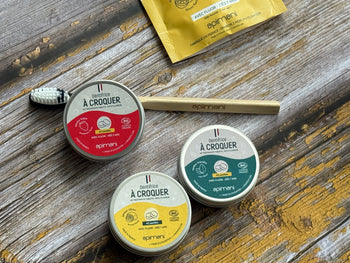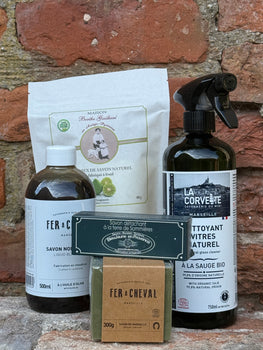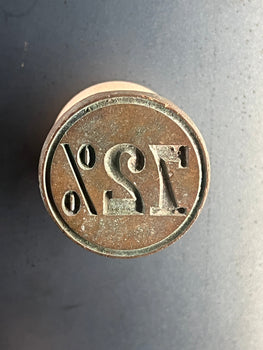
Gifting couldn't be easier
Add a gift message to be emailed to when their parcel arrives, or at a time of your choice.
For centuries, one of the world’s most revered soaps has been quietly crafted in the ancient city of Aleppo, Syria. Known simply as Aleppo Soap, this remarkable bar is often regarded as the ancestor of all hard soaps, including the iconic French Savon de Marseille. Pure, natural, and steeped in tradition, Aleppo Soap is more than a cleanser — it is a piece of cultural heritage.
Aleppo, one of the oldest continuously inhabited cities in the world, is the birthplace of soap as we know it today. Historical records trace the making of Aleppo Soap back over 2,000 years, where artisans developed a method of mixing olive oil, laurel berry oil, water, and lye. This simple yet powerful recipe laid the foundation for traditional soap-making across the Mediterranean.
When conflict disrupted traditional soap-making in Syria, many artisans fled to neighbouring countries such as Turkey, where the craft continues today, still preserving Aleppo’s ancient methods.
Crusaders travelling through the Middle East brought Aleppo’s soap-making methods back to Europe, where they were adapted into the recipe for Savon de Marseille in the 14th century.
The beauty of Aleppo Soap lies in its minimal yet effective formulation:
Olive Oil: Nourishes, hydrates, and softens the skin. Olive oil creates a creamy, gentle lather that is kind to even the most sensitive skin.
Laurel Berry Oil: The hallmark of Aleppo Soap. Rich in natural antibacterial, antifungal, and antiseptic properties, laurel oil gives the soap its distinctive fragrance and therapeutic benefits.
Water and Natural Soda (lye): Essential for saponification, binding the oils into a hard, long-lasting soap.
Depending on the recipe, the concentration of laurel oil varies from 5% to 40%, with higher percentages being particularly prized for their effectiveness in calming irritated skin.
Aleppo Soap is not mass-produced. Instead, it is handmade in workshops, often by families who have passed down their craft for generations. The process is time-intensive and deeply rooted in tradition. Made between December and March each year, Immediately following the local olive oil harvest it then dries and ages for 9 months before being ready to use:
Cooking: Olive oil and lye are gently heated in large vats.
Enrichment: Laurel oil is added at the end of the process to preserve its precious qualities.
Pouring & Cutting: The soap mixture is poured onto the workshop floor, allowed to cool, and then cut into cubes by hand.
Stamping: Each cube is stamped with the maker’s seal, a mark of authenticity.
Aged to Perfection: Bars are stacked in airy rooms and aged for 9 months. During this time, the outside of the bar turns a golden brown while the inside retains a green, olive colour.
This aging process ensures the soap is mild, durable, and highly effective.
Aleppo Soap is renowned for its versatility and therapeutic benefits:
Gentle Cleanser: Suitable for face, body, and hair.
Moisturising: Olive oil keeps skin soft and hydrated.
Antibacterial & Healing: Laurel oil is valued for helping soothe conditions like eczema, psoriasis, and acne.
Hypoallergenic: Free from synthetic additives, fragrances, and preservatives.
Sustainable: 100% natural, biodegradable, and plastic-free.
While both are steeped in Mediterranean tradition, there are distinct differences:
Aleppo Soap is the original – olive oil-based with laurel berry oil.
Marseille Soap is the descendant, traditionally made in Provence with olive oil, often in cube form, and later adapted with palm oil and other vegetable oils.
Both are prized for their purity and eco-friendliness, but Aleppo Soap carries the unique medicinal properties of laurel oil.
Choosing Aleppo Soap is not only about skincare — it is also about supporting a centuries-old craft and a community that has endured despite hardship. The soap continues to be produced using traditional, low-impact methods that respect the environment.
In a world of synthetic detergents and mass production, Aleppo Soap stands out as a zero-waste, sustainable, and artisanal choice that embodies cultural heritage and natural living.
As a daily cleanser for face and body
As a shampoo for hair (best followed with a vinegar rinse for softness)
As a shaving soap, thanks to its creamy lather
As a household soap for delicate laundry items
As a natural alternative for sensitive or irritated skin
Aleppo soap is one of the most natural soaps you can find, versatile it can be used on the face, body and hair, teeth and for shaving. It can be beneficial to those with dermatitis* and also those with oily skin.
For those seeking an authentic, eco-friendly, and timeless soap, Aleppo is not just a choice, but a legacy.
©️ French Soaps UK 2024
If you would like help shopping this article, or have further product or ingredient questions then please contact us and we will be happy to help. E. bonjour@frenchsoaps.co.uk T. 01423 803080
Telephone or Whats App: 01423 803080
Email: bonjour@frenchsoaps.co.uk
Social: @FrenchsoapsUK
Address: Unit 14 Ousegill Business Park, Carr Side Road, Great Ouseburn, North Yorkshire, YO26 9AE
Sign up for our newsletter and get all the latest news, offers and more delivered straight to your inbox. You can unsubscribe at any time. By 'submitting' you are agreeing to our T&C's and Privacy Policy.
Gifting couldn't be easier
Add a gift message to be emailed to when their parcel arrives, or at a time of your choice.



